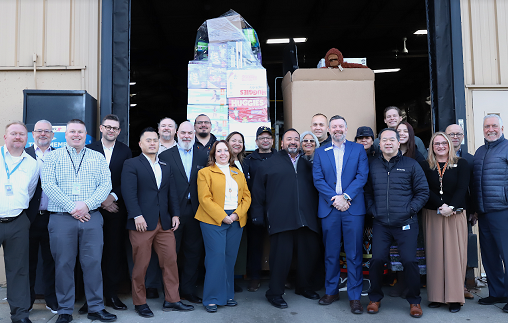
- Details
- By Native News Online Staff
Spearheaded by the Match-E-Be-Nash-She-Wish Band of Pottawatomi Indians (Gun Lake Tribe) and the Gun Lake Casino, the Nottawaseppi Huron Band and the Pokagon Band of the Potawatomi Indians, as well as Gun Lake Investments, came together this past Monday to send a semi-truck of donated goods to the Walpole Island First Nation in Wallaceburg, Ontario, Canada.
The annual“Stuff the Trailer” donation drive sends donated clothing, food, household, and personal items to an underprivileged tribal community. This year the tribal community was Walpole Island First Nation, which is located across the U.S. and Canadian border near Detroit, Michigan.
 Make A Donation Here
Make A Donation Here
“We sincerely thank all our guests and the tribal community here in West Michigan for the overwhelming response to this year’s stuff the trailer donation drive,” Sal Semola, Chief Executive Officer of Gun Lake Casino said. “This yearly occasion holds significance as it provides the Gun Lake Tribe with an opportunity to support fellow tribal nations facing economic challenges in assisting their citizens.”
This year, over $95,000 worth of donated goods were received throughout the month of November. The list of donations this year includes coats, boots, hats, gloves, clothing, toys, non-perishable food, and household items.
More Stories Like This
Native News Weekly (August 25, 2024): D.C. BriefsUS Presidents in Their Own Words Concerning American Indians
Indigenous Actor Elaine Miles Reports Detention by Alleged ICE Agents
Happy Thanksgiving from Native News Online
Coming Up on Native Bidaské: Behind the Animation: Joey Clift Talks “Pow” and Native Storytelling
Help us tell the stories that could save Native languages and food traditions
At a critical moment for Indian Country, Native News Online is embarking on our most ambitious reporting project yet: "Cultivating Culture," a three-year investigation into two forces shaping Native community survival—food sovereignty and language revitalization.
The devastating impact of COVID-19 accelerated the loss of Native elders and with them, irreplaceable cultural knowledge. Yet across tribal communities, innovative leaders are fighting back, reclaiming traditional food systems and breathing new life into Native languages. These aren't just cultural preservation efforts—they're powerful pathways to community health, healing, and resilience.
Our dedicated reporting team will spend three years documenting these stories through on-the-ground reporting in 18 tribal communities, producing over 200 in-depth stories, 18 podcast episodes, and multimedia content that amplifies Indigenous voices. We'll show policymakers, funders, and allies how cultural restoration directly impacts physical and mental wellness while celebrating successful models of sovereignty and self-determination.
This isn't corporate media parachuting into Indian Country for a quick story. This is sustained, relationship-based journalism by Native reporters who understand these communities. It's "Warrior Journalism"—fearless reporting that serves the 5.5 million readers who depend on us for news that mainstream media often ignores.
We need your help right now. While we've secured partial funding, we're still $450,000 short of our three-year budget. Our immediate goal is $25,000 this month to keep this critical work moving forward—funding reporter salaries, travel to remote communities, photography, and the deep reporting these stories deserve.
Every dollar directly supports Indigenous journalists telling Indigenous stories. Whether it's $5 or $50, your contribution ensures these vital narratives of resilience, innovation, and hope don't disappear into silence.
 The stakes couldn't be higher. Native languages are being lost at an alarming rate. Food insecurity plagues many tribal communities. But solutions are emerging, and these stories need to be told.
The stakes couldn't be higher. Native languages are being lost at an alarming rate. Food insecurity plagues many tribal communities. But solutions are emerging, and these stories need to be told.
Support independent Native journalism. Fund the stories that matter.
Levi Rickert (Potawatomi), Editor & Publisher

